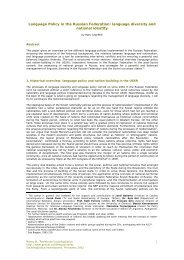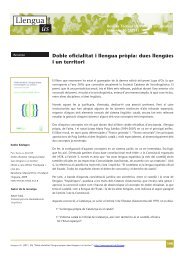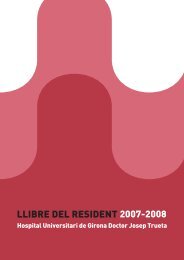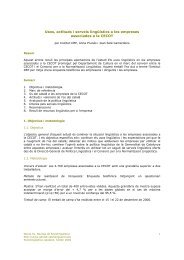Minority Protection and Language Policy in the Czech Republic, by ...
Minority Protection and Language Policy in the Czech Republic, by ...
Minority Protection and Language Policy in the Czech Republic, by ...
You also want an ePaper? Increase the reach of your titles
YUMPU automatically turns print PDFs into web optimized ePapers that Google loves.
<strong>M<strong>in</strong>ority</strong> <strong>Protection</strong> <strong>and</strong> <strong>Language</strong> <strong>Policy</strong> <strong>in</strong> <strong>the</strong> <strong>Czech</strong> <strong>Republic</strong><strong>by</strong> Carol<strong>in</strong> Zwill<strong>in</strong>gAbstractThis article gives an overview of <strong>the</strong> actual situation of national m<strong>in</strong>orities liv<strong>in</strong>g <strong>in</strong> <strong>the</strong> <strong>Czech</strong><strong>Republic</strong> focus<strong>in</strong>g on <strong>the</strong> State’s language policy. Start<strong>in</strong>g from a legally not b<strong>in</strong>d<strong>in</strong>g “Conceptto Issues Concern<strong>in</strong>g National M<strong>in</strong>orities <strong>in</strong> <strong>the</strong> <strong>Czech</strong> <strong>Republic</strong>” <strong>in</strong> 1994, this new memberstate developed a largely satisfactory legal framework for <strong>the</strong> protection of nationalm<strong>in</strong>orities dur<strong>in</strong>g <strong>the</strong> last ten years prepar<strong>in</strong>g <strong>the</strong> accession to <strong>the</strong> European Union.Summary1. Introduction2. General <strong>in</strong>formation: census <strong>and</strong> settlement areas3. Legal framework4. The use of language4.1 In communication with authorities4.2 Names <strong>and</strong> topographical signs4.3 Media5. <strong>M<strong>in</strong>ority</strong> Education6. The national m<strong>in</strong>ority of Roma7. Political Representation <strong>and</strong> Institutions for <strong>the</strong> <strong>Protection</strong> of M<strong>in</strong>orities8. Conclusion9. Bibliography1. IntroductionThe <strong>Czech</strong> <strong>Republic</strong> is one of <strong>the</strong> ten new members who jo<strong>in</strong>ed <strong>the</strong> European Union on May1, 2004. Its 10.2 Million <strong>in</strong>habitants today form 2.2% of <strong>the</strong> total number of all EU citizens.After <strong>the</strong> defeat of <strong>the</strong> Austro-Hungarian Empire dur<strong>in</strong>g World War I, <strong>the</strong> <strong>Czech</strong>s <strong>and</strong> Slovaksdeclared <strong>the</strong>ir <strong>in</strong>dependence <strong>in</strong> 1918 <strong>and</strong> were united as a democratic Federative <strong>Republic</strong> of<strong>Czech</strong>oslovakia. Immediately subsequent to <strong>the</strong> division of <strong>the</strong> <strong>Czech</strong> <strong>and</strong> <strong>the</strong> SlovakFederative <strong>Republic</strong> on January 1, 1993 <strong>and</strong> <strong>the</strong> creation of two <strong>in</strong>dependent unitary states,<strong>the</strong> <strong>Czech</strong> <strong>Republic</strong> started to establish a close relationship to <strong>the</strong> European Union. TheEuropean Association Treaty from 1993 <strong>by</strong> which <strong>the</strong> <strong>Czech</strong> <strong>Republic</strong> acquired <strong>the</strong> status asan associated country entered <strong>in</strong>to force on February 1, 1995 <strong>and</strong> already <strong>in</strong> January 1996<strong>the</strong> State applied for membership <strong>in</strong> <strong>the</strong> European Union. One condition for <strong>the</strong> membershipwas compliance with <strong>the</strong> so-called Copenhagen criteria which <strong>in</strong>clude <strong>the</strong> protection ofhuman rights <strong>and</strong> respect for <strong>and</strong> protection of m<strong>in</strong>orities. 1 The accession negotiations weresuccessfully concluded <strong>in</strong> December 2003 <strong>and</strong> <strong>the</strong> Treaty of Accession was signed on April16, 2003. The majority of <strong>Czech</strong> citizens supported EU membership <strong>in</strong> <strong>the</strong> referendum heldon 13-14 June 2003.2. General <strong>in</strong>formation: census <strong>and</strong> settlement areasIn contrast to <strong>the</strong> strongly heterogeneous ethnic structure of <strong>Czech</strong>oslovakia, <strong>the</strong> <strong>Czech</strong><strong>Republic</strong> became an almost homogenous country. Accord<strong>in</strong>g to <strong>the</strong> most recent Population<strong>and</strong> Hous<strong>in</strong>g Census 2 carried out <strong>by</strong> <strong>the</strong> <strong>Czech</strong> Statistic Office (CSO) <strong>in</strong> co-operation with <strong>the</strong>secretariat of <strong>the</strong> Council of <strong>the</strong> Government for National M<strong>in</strong>orities on March 1, 2001, only9.9% of <strong>the</strong> population (1.022.318 persons) declared a national identity o<strong>the</strong>r than <strong>Czech</strong>,but <strong>in</strong>clud<strong>in</strong>g <strong>the</strong> Moravian <strong>and</strong> Silesian ethnicities (392,524 persons, i.e. 3.8%). 3 The censussheet <strong>and</strong> methodology <strong>in</strong>struction were pr<strong>in</strong>ted also <strong>in</strong> <strong>the</strong> m<strong>in</strong>ority languages Polish,1 The Comprehensive monitor<strong>in</strong>g report on <strong>the</strong> <strong>Czech</strong> <strong>Republic</strong>’s preparations for membership <strong>by</strong> <strong>the</strong>European Commission shows <strong>the</strong> compliance with <strong>the</strong>se conditions.2 Stipulated <strong>in</strong> Act Nr. 158/1999.3 Resolution of <strong>the</strong> Government of <strong>the</strong> <strong>Czech</strong> <strong>Republic</strong> Nr. 600 from June 12,2002 to <strong>the</strong> Report on <strong>the</strong>Situation of National M<strong>in</strong>orities <strong>in</strong> <strong>the</strong> <strong>Czech</strong> <strong>Republic</strong> <strong>in</strong> 2001:.
<strong>M<strong>in</strong>ority</strong> <strong>Protection</strong> <strong>and</strong> <strong>Language</strong> <strong>Policy</strong> <strong>in</strong> <strong>the</strong> <strong>Czech</strong> <strong>Republic</strong>, <strong>by</strong> Carol<strong>in</strong> Zwill<strong>in</strong>gGerman, Roma, Ukra<strong>in</strong>ian <strong>and</strong> Russian, as well as <strong>in</strong> English, French, Vietnamese, Arabic <strong>and</strong>Ch<strong>in</strong>ese. The 2001 census featured under <strong>the</strong> head<strong>in</strong>g “ethnicity” an open question, so thatany identity could be expressed.The representatives of national m<strong>in</strong>orities participated both <strong>in</strong> <strong>the</strong> preparation of <strong>the</strong> census,especially <strong>by</strong> <strong>in</strong>form<strong>in</strong>g <strong>the</strong>ir members publish<strong>in</strong>g regularly <strong>in</strong> m<strong>in</strong>ority periodicals, <strong>and</strong> <strong>the</strong>performance as assistants or census commissioners. Never<strong>the</strong>less, <strong>the</strong> representatives of <strong>the</strong>Polish m<strong>in</strong>ority criticized both <strong>the</strong> shortage of official <strong>in</strong>formation <strong>in</strong> m<strong>in</strong>ority languagespublished <strong>by</strong> <strong>the</strong> Government <strong>and</strong> <strong>the</strong> media, which repeatedly underl<strong>in</strong>ed <strong>the</strong> possiblemisuse of personal data.The most numerous non-<strong>Czech</strong> census group are <strong>the</strong> Moravian <strong>and</strong> <strong>the</strong> Silesian nationalidentities. Even so, <strong>the</strong> citizens of Moravia <strong>and</strong> <strong>Czech</strong> Silesia do not form a recognizednational m<strong>in</strong>ority. These national identities were <strong>in</strong>troduced dur<strong>in</strong>g <strong>the</strong> process of socialtransformation after <strong>the</strong> change of regime <strong>in</strong> 1989 <strong>and</strong> <strong>the</strong> issue of m<strong>in</strong>ority protection waspoliticized <strong>by</strong> leaders of <strong>the</strong> Moravia-oriented movements dur<strong>in</strong>g a discussion about <strong>the</strong> sofar unresolved status of Moravia <strong>and</strong> Silesia <strong>in</strong> <strong>the</strong> territorial <strong>and</strong> adm<strong>in</strong>istrative structure of<strong>the</strong> <strong>Czech</strong> <strong>Republic</strong>. While all data on persons of o<strong>the</strong>r than <strong>Czech</strong> ethnicity are <strong>in</strong> decrease <strong>in</strong>comparison to <strong>the</strong> previous census of 1991, <strong>the</strong> decrease of <strong>the</strong>ses national identitiesreaches a dramatic 70%: from 1.362.313 Moravians <strong>and</strong> 44.446 Silesians, <strong>in</strong> 2001 only373,294 respectively 11,248 declared <strong>the</strong>se identities.The proportion of <strong>the</strong> non-<strong>Czech</strong> population varies with districts <strong>and</strong> regions of <strong>the</strong> <strong>Czech</strong><strong>Republic</strong>. With exception of numerous but dispersed groups of Slovaks <strong>and</strong> Roma, nonational m<strong>in</strong>ority occupies a prom<strong>in</strong>ent position <strong>in</strong> <strong>the</strong> current ethnic make-up. Mostmembers of <strong>the</strong> Slovak national m<strong>in</strong>ority, as <strong>the</strong> largest one, but dispersed throughout <strong>the</strong>entire <strong>Czech</strong> <strong>Republic</strong>, live on <strong>the</strong> territory of <strong>the</strong> Moravian-Silesian Ústí region, Prague, <strong>the</strong>South-Moravian, Middle-Bohemian <strong>and</strong> Karlovy Vary regions. Contrary to <strong>the</strong>ir dispersedsettlement <strong>and</strong> due to history, <strong>the</strong>re is a significant concentration of members of <strong>the</strong> Polishm<strong>in</strong>ority along <strong>the</strong> state border with Pol<strong>and</strong> where, <strong>in</strong> <strong>the</strong> districts of Frydek-Mistek <strong>and</strong>Karv<strong>in</strong>a, <strong>the</strong>y amount to more than 8% of <strong>the</strong> local population. Persons belong<strong>in</strong>g to <strong>the</strong>German national m<strong>in</strong>ority live <strong>in</strong> <strong>the</strong> eastern, nor<strong>the</strong>rn <strong>and</strong> western border regions, <strong>in</strong> anenvironment of former German language isl<strong>and</strong>s. Despite territorial dispersion throughout<strong>the</strong> <strong>Czech</strong> <strong>Republic</strong>, <strong>the</strong> Roma population can be considered as concentrated <strong>in</strong> <strong>in</strong>dustrialcities <strong>in</strong> Nor<strong>the</strong>rn Bohemia <strong>and</strong> Nor<strong>the</strong>rn Moravia as well as <strong>in</strong> Prague. In <strong>the</strong> same way, <strong>the</strong>less numerous national m<strong>in</strong>orities of Bulgarians, Russians, Ru<strong>the</strong>nians, Ukra<strong>in</strong>ians, Greek,Bulgarians, Romanians <strong>and</strong> also Jewish m<strong>in</strong>orities liv<strong>in</strong>g dispersed throughout <strong>the</strong> countryare concentrated especially <strong>in</strong> Prague <strong>and</strong> o<strong>the</strong>r <strong>in</strong>dustrial cities.3. Legal frameworkNational m<strong>in</strong>orities’ rights are protected <strong>by</strong> <strong>in</strong>ternational law 4 , constitutional laws <strong>and</strong>domestic laws for some specific areas. 5 Worth mention<strong>in</strong>g are bilateral agreements between<strong>the</strong> <strong>Czech</strong> <strong>Republic</strong> <strong>and</strong> neighbor<strong>in</strong>g countries, <strong>in</strong> particular <strong>the</strong> Federal <strong>Republic</strong> of Germany,Pol<strong>and</strong> <strong>and</strong> Slovakia, which guarantee <strong>the</strong> protection of rights of persons belong<strong>in</strong>g to <strong>the</strong>respective national m<strong>in</strong>ority. Article 10 of <strong>the</strong> Constitution of <strong>the</strong> <strong>Czech</strong> <strong>Republic</strong> gives humanrights treaties precedence over domestic law.The basic protection of national m<strong>in</strong>orities is determ<strong>in</strong>ed <strong>by</strong> <strong>the</strong> Constitution 6 <strong>and</strong> <strong>the</strong> Charterof Rights <strong>and</strong> Freedoms 7 as a part of <strong>the</strong> constitutional order. The Charter confers bothcollective <strong>and</strong> <strong>in</strong>dividual rights. It differentiates between national <strong>and</strong> ethnic m<strong>in</strong>oritieswithout def<strong>in</strong><strong>in</strong>g this difference. In 1994, <strong>the</strong> Government of <strong>the</strong> <strong>Czech</strong> <strong>Republic</strong> formulatedsome legally not b<strong>in</strong>d<strong>in</strong>g pr<strong>in</strong>ciples of <strong>the</strong> policy concern<strong>in</strong>g national m<strong>in</strong>orities <strong>in</strong> <strong>the</strong>document “Concept to Issues Concern<strong>in</strong>g National M<strong>in</strong>orities <strong>in</strong> <strong>the</strong> <strong>Czech</strong> <strong>Republic</strong>”. 8 After a4 For <strong>in</strong>stance, <strong>the</strong> Framework Convention on <strong>the</strong> <strong>Protection</strong> of National M<strong>in</strong>orities, <strong>the</strong> International Pacton Civil <strong>and</strong> Political Rights, <strong>the</strong> International Convention on <strong>the</strong> Elim<strong>in</strong>ation of All Forms of RacialDiscrim<strong>in</strong>ation. See V. Týc, “International Agreements <strong>in</strong> <strong>the</strong> Legal Orders of <strong>the</strong> C<strong>and</strong>idate Countries”,<strong>in</strong> A. Ott, K. Inglis (eds.), H<strong>and</strong>book on European Enlargement, T.M.C. Asser Instituut, The Hague, 2002,pp. 229-237.5 Accord<strong>in</strong>g to <strong>the</strong> State Report submitted <strong>by</strong> <strong>the</strong> <strong>Czech</strong> <strong>Republic</strong> to <strong>the</strong> Council of Europe <strong>in</strong> 1999 as oneof its obligations under <strong>the</strong> Framework Convention on <strong>the</strong> <strong>Protection</strong> of National M<strong>in</strong>orities (see Art. 25 §1), available at .6 Act N. 1/1993. At . See also <strong>the</strong> electronic database <strong>M<strong>in</strong>ority</strong> Rights Information System (MIRIS) at 7 Act N. 2/1993. At .8 Government Resolution No. 63/1994Noves SL. Revista de Sociol<strong>in</strong>güísticahttp://www.gencat.cat/llengua/novesAutumn 20042
<strong>M<strong>in</strong>ority</strong> <strong>Protection</strong> <strong>and</strong> <strong>Language</strong> <strong>Policy</strong> <strong>in</strong> <strong>the</strong> <strong>Czech</strong> <strong>Republic</strong>, <strong>by</strong> Carol<strong>in</strong> Zwill<strong>in</strong>glong period of difficult discussions, <strong>in</strong> June 2001 a Law on Ethnic <strong>and</strong> National M<strong>in</strong>orities(<strong>M<strong>in</strong>ority</strong> Act) 9 was f<strong>in</strong>ally approved <strong>by</strong> <strong>the</strong> <strong>Czech</strong> Chamber of Deputies, enter<strong>in</strong>g <strong>in</strong>to forceon August 2 nd , 2001.This <strong>M<strong>in</strong>ority</strong> Act specifies <strong>the</strong> rights of members of national m<strong>in</strong>orities <strong>and</strong> <strong>the</strong> competenceof m<strong>in</strong>istries, adm<strong>in</strong>istrative authorities <strong>and</strong> authorities of territorial self-adm<strong>in</strong>istration units<strong>in</strong> relation to <strong>the</strong>se rights. Although <strong>the</strong> Act was largely based on <strong>the</strong> Framework Conventionon <strong>the</strong> <strong>Protection</strong> of National M<strong>in</strong>orities 10 , it differs <strong>in</strong> a fundamental way. § 2 <strong>M<strong>in</strong>ority</strong> Actgives def<strong>in</strong>itions for <strong>the</strong> basic terms “national m<strong>in</strong>ority” <strong>and</strong> “a member of a nationalm<strong>in</strong>ority”:(1) A national m<strong>in</strong>ority is a community of citizens of <strong>the</strong> <strong>Czech</strong> <strong>Republic</strong> who live on <strong>the</strong>territory of <strong>the</strong> present <strong>Czech</strong> <strong>Republic</strong> <strong>and</strong> as a rule differ from o<strong>the</strong>r citizens <strong>by</strong> <strong>the</strong>ircommon ethnic orig<strong>in</strong>, language, culture <strong>and</strong> traditions; <strong>the</strong>y represent a m<strong>in</strong>ority of citizens<strong>and</strong> at <strong>the</strong> same time <strong>the</strong>y show <strong>the</strong>ir will to be considered a national m<strong>in</strong>ority for <strong>the</strong>purpose of common efforts to preserve <strong>and</strong> develop <strong>the</strong>ir own identity, language <strong>and</strong> culture<strong>and</strong> at <strong>the</strong> same time express <strong>and</strong> preserve <strong>in</strong>terests of <strong>the</strong>ir community which has beenformed dur<strong>in</strong>g history.(2) The member of a national m<strong>in</strong>ority is a citizen of <strong>the</strong> <strong>Czech</strong> <strong>Republic</strong> who professes o<strong>the</strong>rthan <strong>Czech</strong> ethnic orig<strong>in</strong> <strong>and</strong> wishes to be considered a member of a national m<strong>in</strong>ority <strong>in</strong>common with <strong>the</strong> o<strong>the</strong>rs who profess <strong>the</strong> same ethnic orig<strong>in</strong>.Fur<strong>the</strong>rmore, <strong>the</strong> <strong>M<strong>in</strong>ority</strong> Act foresees a Council of <strong>the</strong> Government for National M<strong>in</strong>orities asconsultative <strong>and</strong> <strong>in</strong>itiative body headed <strong>by</strong> a member of <strong>the</strong> Government. Never<strong>the</strong>less, thislaw is criticized not only <strong>by</strong> representatives of <strong>the</strong> national m<strong>in</strong>orities, but also <strong>by</strong> NGO’s 11s<strong>in</strong>ce it offers considerably less protection than early drafts <strong>and</strong> it may have little relevancefor Roma, given <strong>the</strong> 10% threshold for application. Moreover, <strong>the</strong> UN Commission forElim<strong>in</strong>ation of all Forms of Racial Discrim<strong>in</strong>ation repeatedly criticized <strong>the</strong> lack of legalprovisions for <strong>the</strong> protection of m<strong>in</strong>orities from discrim<strong>in</strong>ation, s<strong>in</strong>ce <strong>the</strong> <strong>M<strong>in</strong>ority</strong> Act wasrestricted to rights related to <strong>the</strong> development of national m<strong>in</strong>orities without fac<strong>in</strong>g <strong>the</strong>problems of discrim<strong>in</strong>ation.4. The use of language<strong>Language</strong> <strong>and</strong> <strong>the</strong> ability to use <strong>the</strong> own m<strong>in</strong>ority language freely, <strong>in</strong> private as well as publiclife, serve for most m<strong>in</strong>orities as a means of unity of <strong>the</strong> group <strong>and</strong> a source of selfidentificationfor <strong>the</strong> <strong>in</strong>dividual.4.1 In communication with authoritiesNei<strong>the</strong>r <strong>the</strong> Constitution does conta<strong>in</strong> any specific mention of an official or state language nordoes any o<strong>the</strong>r <strong>Czech</strong> law def<strong>in</strong>e <strong>the</strong> official language or <strong>the</strong> one of official communication.The status of <strong>the</strong> <strong>Czech</strong> language as <strong>the</strong> official one is, however, implicit <strong>in</strong> some legalregulations. 12 German, Polish, Hungarian, Ukra<strong>in</strong>ian, Romany, Slovak <strong>and</strong> Croatian arespoken <strong>in</strong> <strong>the</strong> <strong>Czech</strong> <strong>Republic</strong>, though only <strong>the</strong> first four are recognized as official m<strong>in</strong>oritylanguages.The right of ethnic <strong>and</strong> national m<strong>in</strong>orities to use <strong>the</strong>ir language <strong>in</strong> communication withauthorities is primarily based on <strong>the</strong> Constitution, Article 25/2/b. In addition, some legalregulations provide that every person who states that he does not speak <strong>Czech</strong> has <strong>the</strong> rightto use his or her mo<strong>the</strong>r tongue before <strong>the</strong> court <strong>and</strong> before <strong>the</strong> bodies <strong>in</strong>volved <strong>in</strong> crim<strong>in</strong>alproceed<strong>in</strong>gs. 13 The expenditures connected to <strong>the</strong> service of an <strong>in</strong>terpreter are covered <strong>by</strong><strong>the</strong> state. However, <strong>the</strong> Government notes that “<strong>in</strong> respect of <strong>the</strong> Romani national m<strong>in</strong>ority,an unresolved problem is an entirely <strong>in</strong>sufficient number of Romani <strong>in</strong>terpreters”. 149 Act on rights of members of national m<strong>in</strong>orities <strong>and</strong> amendment of some acts N. 273/2001, at.10 See at .11See <strong>the</strong> Report Monitor<strong>in</strong>g <strong>the</strong> EU Accession Process <strong>by</strong> <strong>the</strong> Open Society Institute() <strong>and</strong> <strong>the</strong> Report on Ethnic <strong>and</strong> National M<strong>in</strong>orities, May 28, 2002, <strong>by</strong> <strong>the</strong>International Hels<strong>in</strong>ki Federation of Human Rights ().12 The Defence Act, some registries, <strong>the</strong> judiciary, <strong>the</strong> Law on Acquisition <strong>and</strong> Loss of Citizenship of <strong>the</strong><strong>Czech</strong> <strong>Republic</strong>.13 e.g. §18 of <strong>the</strong> Civil Procedure Code, §7 of <strong>the</strong> Law on Courts <strong>and</strong> Judges <strong>and</strong> §2 of Act on judicialcrim<strong>in</strong>al proceed<strong>in</strong>gs.14 See .Noves SL. Revista de Sociol<strong>in</strong>güísticahttp://www.gencat.cat/llengua/novesAutumn 20043
<strong>M<strong>in</strong>ority</strong> <strong>Protection</strong> <strong>and</strong> <strong>Language</strong> <strong>Policy</strong> <strong>in</strong> <strong>the</strong> <strong>Czech</strong> <strong>Republic</strong>, <strong>by</strong> Carol<strong>in</strong> Zwill<strong>in</strong>g4.2 Names <strong>and</strong> topographical signsAccord<strong>in</strong>g to §7 of <strong>the</strong> <strong>M<strong>in</strong>ority</strong> Act <strong>the</strong> members of m<strong>in</strong>orities are allowed to use <strong>the</strong>ir names<strong>and</strong> surnames <strong>in</strong> <strong>the</strong>ir language. S<strong>in</strong>ce <strong>the</strong>re are strict conditions determ<strong>in</strong>ed <strong>by</strong> a special Acton registers, names <strong>and</strong> surnames 15 <strong>in</strong> practical terms only female citizen of <strong>the</strong> <strong>Czech</strong><strong>Republic</strong> or <strong>the</strong> parents of a female child under legal age can ask for <strong>the</strong> entry of anunchanged surname <strong>in</strong>to a register, if <strong>the</strong>y make an affidavit of <strong>the</strong>ir membership <strong>in</strong> anational m<strong>in</strong>ority. Although all representatives of national m<strong>in</strong>orities basically embraced thisnew Act on Registers, <strong>the</strong>y underl<strong>in</strong>e that practical problems are not sufficiently reflected.For <strong>in</strong>stance, <strong>the</strong>y criticize <strong>the</strong> adm<strong>in</strong>istrative fee of 1,000 CZK 16 for <strong>the</strong> change of an entry,especially for seniors.In addition, <strong>the</strong> <strong>M<strong>in</strong>ority</strong> Act stipulates that bil<strong>in</strong>gual geographical names, as e.g. forcommunities, streets, public places, build<strong>in</strong>gs of government bodies <strong>and</strong> territorial selfgovern<strong>in</strong>gunits, can be used. 17 But <strong>in</strong> practice, as stated <strong>by</strong> <strong>the</strong> Government’s Report on <strong>the</strong>Situation of National M<strong>in</strong>orities from June 2002 18 , <strong>the</strong> right to <strong>in</strong>scribe communities, streets<strong>and</strong> public places with names <strong>in</strong> <strong>the</strong> m<strong>in</strong>ority language has not been exercised yet. Thisarises probably from <strong>the</strong> fact that this right can be exercised only if 10% of <strong>the</strong> local citizensacknowledge membership <strong>in</strong> a national m<strong>in</strong>ority <strong>and</strong> 40% of adult citizens of <strong>the</strong>m ask forthis <strong>by</strong> petition. In September 2003, <strong>the</strong> Polish-speak<strong>in</strong>g m<strong>in</strong>ority liv<strong>in</strong>g <strong>in</strong> <strong>the</strong> region ofSilesia started to collect signatures for bil<strong>in</strong>gual signs. The largest town, called ÈeskýTìsín/Czeski Cieszyn, was divided <strong>in</strong>to a Polish <strong>and</strong> a <strong>Czech</strong>oslovak part after <strong>the</strong> collapse of<strong>the</strong> Austro-Hungarian Empire <strong>in</strong> 1918. The percentage of <strong>the</strong> Polish-speak<strong>in</strong>g citizensnowadays st<strong>and</strong>s only at 16.1% based on <strong>the</strong> last census. Fur<strong>the</strong>rmore, <strong>the</strong>y entered <strong>in</strong>tonegotiations with <strong>the</strong> <strong>Czech</strong> Interior M<strong>in</strong>istry to <strong>in</strong>troduce bil<strong>in</strong>gual documents as e.g. birth,marriage <strong>and</strong> death certificates. 194.3 MediaBroadcast<strong>in</strong>g media <strong>and</strong> language-related regulations have a strong impact on <strong>the</strong> life ofpersons belong<strong>in</strong>g to m<strong>in</strong>orities. 20 While members of m<strong>in</strong>orities have freedom of access to<strong>the</strong> media, at <strong>the</strong> same time, <strong>the</strong> broadcasters 21 have <strong>the</strong> right, guaranteed <strong>by</strong> law, tobroadcast <strong>the</strong>ir programmes freely <strong>and</strong> <strong>in</strong>dependently. Therefore, <strong>in</strong>terference with <strong>the</strong>sebroadcasters is only permitted on <strong>the</strong> basis of <strong>the</strong> law <strong>and</strong> with<strong>in</strong> its limits.The Law on <strong>Czech</strong> Television of 1991 22 (CT) states that among <strong>the</strong> ma<strong>in</strong> tasks of CT is <strong>the</strong>creation <strong>and</strong> transmission of programmes <strong>and</strong> <strong>the</strong> provision of a balanced selection ofprogrammes to all sections of <strong>the</strong> population with regard to <strong>the</strong>ir ethnic or nationalbackground <strong>and</strong> national identity <strong>and</strong> <strong>the</strong> development of <strong>the</strong> cultural identity of <strong>the</strong>population of <strong>the</strong> <strong>Czech</strong> <strong>Republic</strong>, <strong>in</strong>clud<strong>in</strong>g members of national m<strong>in</strong>orities. But <strong>in</strong> practice,m<strong>in</strong>ority languages are still not used <strong>in</strong> public television. Because of <strong>the</strong> severe criticism <strong>by</strong>representatives of national m<strong>in</strong>orities, <strong>the</strong> Council of Government for National M<strong>in</strong>oritieslaunched <strong>in</strong>itiatives for <strong>the</strong> improvement of co-operation between CT <strong>and</strong> national m<strong>in</strong>orities.The Broadcast<strong>in</strong>g Act on radio <strong>and</strong> television of 2001 23 deals with <strong>the</strong> rights <strong>and</strong> dutiesconcern<strong>in</strong>g <strong>the</strong> programme content. As well as <strong>in</strong>sist<strong>in</strong>g <strong>in</strong> objective <strong>and</strong> balanced news <strong>and</strong>current affairs programm<strong>in</strong>g, it imposes additional responsibilities on <strong>the</strong> statutorybroadcaster <strong>by</strong> requir<strong>in</strong>g <strong>in</strong> Article 31(4) a preparation of a programme structure “so as toprovide, <strong>in</strong> its broadcast<strong>in</strong>g, a well-balanced portfolio offered to all <strong>the</strong> population withrespect to <strong>the</strong>ir age, gender, color of <strong>the</strong> sk<strong>in</strong>, faith, religion, political or o<strong>the</strong>r op<strong>in</strong>ions,ethnic, national or social orig<strong>in</strong>, <strong>and</strong> membership of a m<strong>in</strong>ority”. Never<strong>the</strong>less, m<strong>in</strong>ority15 Act N. 301/2001.16 $ 1=27 CZK ca. on March 16, 2004.17 § 29/2 of Act N. 1128/2000 Coll. on communities.18 At http://wtd.vlada.cz/files/rvk/rnm/zprava_mens<strong>in</strong>y_2001_en.pdf.19 For fur<strong>the</strong>r <strong>in</strong>formation see.20 For general <strong>in</strong>formation <strong>and</strong> as an overview about all OSCE countries see <strong>the</strong> study commissioned <strong>by</strong><strong>the</strong> OSCE High Commissioner on National M<strong>in</strong>orities on <strong>M<strong>in</strong>ority</strong>-<strong>Language</strong> Related Broadcast<strong>in</strong>g <strong>and</strong>Legislation <strong>in</strong> <strong>the</strong> OSCE, at .21 In December 2003, <strong>the</strong>re is one national public television operator (with two channels), two privatetelevision operators, 12 regional television operators, 16 local television operators, 10 satellite operators<strong>and</strong> 11 cable operators.22 Law N. 483/1991 as subsequently amended <strong>by</strong> Law N. 39/2001, at .23 Law N. 231/2001, at .Noves SL. Revista de Sociol<strong>in</strong>güísticahttp://www.gencat.cat/llengua/novesAutumn 20044
<strong>M<strong>in</strong>ority</strong> <strong>Protection</strong> <strong>and</strong> <strong>Language</strong> <strong>Policy</strong> <strong>in</strong> <strong>the</strong> <strong>Czech</strong> <strong>Republic</strong>, <strong>by</strong> Carol<strong>in</strong> Zwill<strong>in</strong>glanguages are used only <strong>in</strong> programmes prepared <strong>by</strong> m<strong>in</strong>ority editorial boards (German,Polish, Roma <strong>and</strong> Slovak).Accord<strong>in</strong>g to <strong>the</strong> Press Act of 2000 24 , members of m<strong>in</strong>orities can exercise <strong>the</strong>ir right ondissem<strong>in</strong>ation <strong>and</strong> reception of <strong>in</strong>formation unlimitedly. As a consequence, own press <strong>by</strong> <strong>the</strong>organizations of national m<strong>in</strong>orities is one of <strong>the</strong> preferred activities for <strong>the</strong> development of<strong>the</strong>ir culture <strong>and</strong> <strong>the</strong>ir national identity. So many periodical <strong>and</strong> non-periodical papers arepublished, supported <strong>by</strong> subsidies from <strong>the</strong> State Budget.The Council for Radio <strong>and</strong> Television Broadcast<strong>in</strong>g 25 is <strong>the</strong> adm<strong>in</strong>istrative body supervis<strong>in</strong>g<strong>the</strong> observance of legislation regulat<strong>in</strong>g radio <strong>and</strong> television broadcast<strong>in</strong>g <strong>and</strong> thus also <strong>the</strong>composition of programmes. In its Op<strong>in</strong>ion on <strong>the</strong> <strong>Czech</strong> <strong>Republic</strong> 26 , <strong>the</strong> Council of EuropeAdvisory Committee on <strong>the</strong> Framework Convention for <strong>the</strong> <strong>Protection</strong> of National M<strong>in</strong>oritiescriticizes this practice <strong>and</strong> recommends measures. In particular, <strong>the</strong>y noted <strong>the</strong>dissatisfaction expressed <strong>by</strong> <strong>the</strong> small m<strong>in</strong>orities represented <strong>in</strong> <strong>the</strong> Government’s Council forNational M<strong>in</strong>orities with regard to <strong>the</strong> time <strong>and</strong> length of programmes broadcasted <strong>in</strong>m<strong>in</strong>ority languages on <strong>the</strong> <strong>Czech</strong> radio.5. <strong>M<strong>in</strong>ority</strong> EducationArticle 25 of <strong>the</strong> Charter provides for education <strong>in</strong> m<strong>in</strong>ority languages <strong>and</strong> <strong>the</strong> <strong>M<strong>in</strong>ority</strong> Actguarantees <strong>the</strong> right to be educated <strong>in</strong> <strong>the</strong> m<strong>in</strong>ority language from nursery school levelthrough to secondary schools.For <strong>the</strong> practical application of <strong>the</strong> legal rules, <strong>the</strong> M<strong>in</strong>istry of Education, Youth <strong>and</strong> Sportsestablished a Consultative Group of <strong>the</strong> M<strong>in</strong>ister of Education for <strong>the</strong> Affairs of <strong>M<strong>in</strong>ority</strong>Education whose members were recruited <strong>in</strong> 2001 from <strong>the</strong> representatives of Polish,German, Roma, Slovak, Hungarian <strong>and</strong> Ukra<strong>in</strong>ian m<strong>in</strong>orities liv<strong>in</strong>g <strong>in</strong> <strong>the</strong> <strong>Czech</strong> <strong>Republic</strong> aswell as <strong>the</strong> Jewish community.Although <strong>the</strong> <strong>M<strong>in</strong>ority</strong> Act does not give any m<strong>in</strong>imum of threshold for m<strong>in</strong>ority childrennecessary to establish a class <strong>in</strong> <strong>the</strong> m<strong>in</strong>ority language, accord<strong>in</strong>g to <strong>the</strong> Government’sReport 27 <strong>the</strong> education <strong>in</strong> m<strong>in</strong>ority languages with<strong>in</strong> <strong>the</strong> system of state education is possibleonly <strong>in</strong> <strong>the</strong> case of more numerous m<strong>in</strong>orities which allow a sufficient number of pupils <strong>in</strong><strong>the</strong>ir domicile. Therefore, this right is fully exercised only for <strong>the</strong> benefit of Polish children.The Polish national m<strong>in</strong>ority disposes of a network of schools <strong>in</strong> <strong>the</strong> districts Karv<strong>in</strong>á <strong>and</strong>Frýdek-Místek which <strong>in</strong>cludes k<strong>in</strong>dergartens, primary schools, grammar schools <strong>and</strong>secondary modern schools with Polish as <strong>the</strong> only teach<strong>in</strong>g language.The dispersed settlement complicates m<strong>in</strong>ority education for <strong>the</strong> small Bulgarian, Croatian,Ru<strong>the</strong>nian, Russian, Greek <strong>and</strong> Ukra<strong>in</strong>ian m<strong>in</strong>orities <strong>and</strong> even for <strong>the</strong> more numerousGerman, Hungarian, Roma <strong>and</strong> Slovak m<strong>in</strong>orities. Thus <strong>the</strong> system of state educationsupports <strong>the</strong> education of members of <strong>the</strong> Polish, German <strong>and</strong> Roma m<strong>in</strong>orities while o<strong>the</strong>rnational m<strong>in</strong>orities are educated only with<strong>in</strong> <strong>the</strong> framework of additional educationalprogrammes <strong>by</strong> means of grants for out-of-school activities. The representatives of <strong>the</strong>German m<strong>in</strong>ority acknowledge that <strong>the</strong> establishment of German schools is not realistic.Never<strong>the</strong>less, a part of <strong>the</strong>ir members have <strong>in</strong>voked <strong>the</strong> establishment of bil<strong>in</strong>gual schools,with <strong>the</strong> predom<strong>in</strong>ance of German as teach<strong>in</strong>g language.6. The Roma national m<strong>in</strong>orityThe Roma m<strong>in</strong>ority holds an exceptional position with<strong>in</strong> <strong>the</strong> general situation of nationalm<strong>in</strong>orities <strong>in</strong> <strong>the</strong> <strong>Czech</strong> <strong>Republic</strong>. They were recognized as national m<strong>in</strong>ority for <strong>the</strong> first time<strong>by</strong> <strong>the</strong> Constitution of 1993. Although Roma ethnicity was declared <strong>by</strong> 11,716 persons dur<strong>in</strong>g<strong>the</strong> last census, it is well known that <strong>the</strong>se data do not correspond to <strong>the</strong> real number ofRoma liv<strong>in</strong>g <strong>in</strong> <strong>the</strong> <strong>Czech</strong> <strong>Republic</strong>. In general it is presumed that <strong>the</strong>ir number oscillatesbetween 150,000-200,000 persons. Of this number 20,000 are Vlax Roma whose culture <strong>and</strong>language is substantially different. More than 95% of Roma moved to <strong>the</strong> <strong>Czech</strong> <strong>Republic</strong>from Slovakia after <strong>the</strong> Second World War or are descendants of <strong>the</strong>se migrants. Experienceswith <strong>the</strong> persecution dur<strong>in</strong>g <strong>the</strong> Fascist period <strong>and</strong> daily discrim<strong>in</strong>ation due to <strong>the</strong> aversion of24 Law N. 46/2000, at .25 For fur<strong>the</strong>r <strong>in</strong>formation see .26 Adopted on 6 April 2001, at .27 See reference 17.Noves SL. Revista de Sociol<strong>in</strong>güísticahttp://www.gencat.cat/llengua/novesAutumn 20045
<strong>M<strong>in</strong>ority</strong> <strong>Protection</strong> <strong>and</strong> <strong>Language</strong> <strong>Policy</strong> <strong>in</strong> <strong>the</strong> <strong>Czech</strong> <strong>Republic</strong>, <strong>by</strong> Carol<strong>in</strong> Zwill<strong>in</strong>g<strong>the</strong> majority towards Roma result <strong>in</strong> <strong>the</strong> low number of declarations as “romipen” (ethnic <strong>and</strong>cultural Roma identity).Roma still to date suffer disproportionately from poverty, unemployment, <strong>in</strong>terethnicviolence, discrim<strong>in</strong>ation, illiteracy <strong>and</strong> disease. 28 In 1997, <strong>the</strong> Inter-M<strong>in</strong>isterial Commissionfor Roma Community Affairs 29 was established as an advisory authority which addressesproblems experienced <strong>by</strong> <strong>the</strong> Roma m<strong>in</strong>ority. Their aim is, <strong>in</strong> particular, to advance <strong>the</strong><strong>in</strong>tegration of Roma <strong>and</strong> to <strong>in</strong>form <strong>the</strong> majority population about <strong>the</strong> Roma m<strong>in</strong>ority. In June2000, <strong>the</strong> Government adopted a policy for Roma, <strong>the</strong> “Concept for Roma Integration”,funded <strong>by</strong> <strong>the</strong> State Budget, <strong>and</strong> updated <strong>in</strong> January 2002. The ma<strong>in</strong> priorities for <strong>the</strong> future<strong>in</strong>clude not only anti-discrim<strong>in</strong>ation measures <strong>and</strong> ensur<strong>in</strong>g <strong>the</strong> security of <strong>the</strong> Roma, buteven more affirmative actions <strong>in</strong> education, employment, social <strong>and</strong> health care <strong>and</strong> hous<strong>in</strong>g.Although <strong>the</strong> National Plan on Employment for 2002 <strong>and</strong> also various activities of <strong>the</strong>Committee for Long-term Unemployed for <strong>the</strong> most disadvantaged groups on <strong>the</strong> labourmarket could slightly improve <strong>the</strong> situation for Roma, widespread discrim<strong>in</strong>ation cont<strong>in</strong>ues.A number of Roma media <strong>in</strong>itiatives exist, as for <strong>in</strong>stance a weekly one-hour program <strong>by</strong> <strong>the</strong><strong>Czech</strong> Radio <strong>and</strong> four Roma periodicals funded from <strong>the</strong> M<strong>in</strong>istry of Culture. Never<strong>the</strong>less,<strong>the</strong> most problematic field is still <strong>the</strong> educational system. It is estimated that between 75%<strong>and</strong> 85% of all Roma children do not complete <strong>the</strong>ir education <strong>in</strong> <strong>the</strong> "ma<strong>in</strong>stream" schoolsystem. Many Roma students drop-out or end up <strong>in</strong> "special schools" for children withdisabilities. These schools offer a lower quality level of education <strong>and</strong> students progress at aslower rate, leav<strong>in</strong>g <strong>the</strong>m hopelessly beh<strong>in</strong>d students <strong>in</strong> "ma<strong>in</strong>stream" schools. The resulthas been <strong>the</strong> creation of an unofficial segregated school system <strong>in</strong> which some specialschools have a majority of Roma <strong>and</strong> o<strong>the</strong>rs are all Roma. The Government approved a setof measures deal<strong>in</strong>g with <strong>the</strong> education of Roma children. Approv<strong>in</strong>g <strong>the</strong> above mentionedpolicy for Roma, <strong>the</strong> Government reacted to <strong>the</strong> recommendations of <strong>the</strong> UN Human RightsCommittee, which deplored <strong>the</strong> segregation of Roma children <strong>in</strong> special schools. Themeasures <strong>in</strong>clude <strong>the</strong> dissem<strong>in</strong>ation of <strong>in</strong>formation material, a voluntary full-time school<strong>in</strong>gpilot project <strong>in</strong> five primary schools, <strong>and</strong> <strong>the</strong> cont<strong>in</strong>uation of <strong>the</strong> preparatory classes’ scheme.As a result of <strong>the</strong> low educational st<strong>and</strong>ards <strong>and</strong> even more due to <strong>the</strong> fact that someemployers refuse to hire Roma <strong>and</strong> even ask local labor offices not to send Romaniapplicants for advertised positions, <strong>the</strong> rate of unemployment is disproportionately high.Roma face discrim<strong>in</strong>ation also <strong>in</strong> hous<strong>in</strong>g <strong>and</strong> o<strong>the</strong>r areas of everyday life, e.g. access torestaurants. 30 Moreover, <strong>the</strong> pattern of violent abuse of Roma at <strong>the</strong> h<strong>and</strong>s of police officers<strong>and</strong> private actors persists <strong>and</strong> <strong>the</strong> authorities often fail to <strong>in</strong>vestigate <strong>and</strong> prosecute suchcrimes. 317. Political Representation <strong>and</strong> Institutions for <strong>the</strong> <strong>Protection</strong> of M<strong>in</strong>oritiesThere are no special rights ensur<strong>in</strong>g parliamentary participation for m<strong>in</strong>orities, <strong>and</strong> today as<strong>in</strong>gle Roma MP sits <strong>in</strong> <strong>the</strong> <strong>Czech</strong> Parliament. 32 The <strong>Czech</strong> <strong>Republic</strong>'s only political party ofRoma, <strong>the</strong> "Romani Civil Initiative" has not succeeded <strong>in</strong> w<strong>in</strong>n<strong>in</strong>g seats s<strong>in</strong>ce 1992 <strong>and</strong> Romac<strong>and</strong>idates rarely top <strong>the</strong> five percent threshold for election, also because <strong>the</strong>re is no28 See as example for this general op<strong>in</strong>ion towards <strong>the</strong> Roma’s situation <strong>the</strong> Country Report on HumanRights Practices 2003, released <strong>by</strong> Bureau of Democracy, Human Rights <strong>and</strong> Labor on February 25,2004, available at .29 Now called <strong>the</strong> Council for Roma Affairs, it has 14 Roma regional representatives <strong>and</strong> an equal numberof officials from <strong>the</strong> m<strong>in</strong>istries.30 On May 28, 2002, <strong>the</strong> High Court of Justice <strong>in</strong> Prague decided that denial of access of Mr Jan Kovác, aRomani man, to <strong>the</strong> Drago Inferno club <strong>in</strong> <strong>the</strong> western <strong>Czech</strong> city of Karlovy Vary constituted a grossviolation of human dignity <strong>and</strong> that Mr Kovác was entitled to non-pecuniary damages. See Roma Rights2/2002, at www.errc.org/rr_nr2_2002/snap6.shtml. See <strong>the</strong> ridiculous letter of apology, as ordered <strong>by</strong><strong>the</strong> Regional Court of Plzen, at .31 The United Nations Committee Aga<strong>in</strong>st Torture, Conclusions <strong>and</strong> Recommendations concern<strong>in</strong>g <strong>the</strong>compliance of <strong>the</strong> <strong>Czech</strong> <strong>Republic</strong> with <strong>the</strong> Convention Aga<strong>in</strong>st Torture, 14 May 2001. See32 Monika Horakova was elected <strong>in</strong> 1998 national elections as a c<strong>and</strong>idate of <strong>the</strong> Union of Freedom party.See e.g. Romano Hangos, "I don't want to associate with people who I don't underst<strong>and</strong>", Vol. 1. No. 5,29 April 2000; as well as Mahulena Hosková, “Die Rechtsstellung der M<strong>in</strong>derheiten <strong>in</strong> der TschechischenRepublik” <strong>in</strong> Georg Brunner, Boris Meissner (eds.), Das Recht der nationalen M<strong>in</strong>derheiten <strong>in</strong> Osteruropa,Berl<strong>in</strong> Verlag Arno Spitz, Berl<strong>in</strong>, 1999, pp. 91-112.Noves SL. Revista de Sociol<strong>in</strong>güísticahttp://www.gencat.cat/llengua/novesAutumn 20046
<strong>M<strong>in</strong>ority</strong> <strong>Protection</strong> <strong>and</strong> <strong>Language</strong> <strong>Policy</strong> <strong>in</strong> <strong>the</strong> <strong>Czech</strong> <strong>Republic</strong>, <strong>by</strong> Carol<strong>in</strong> Zwill<strong>in</strong>gcommon representative for Romani positions <strong>in</strong> issues that affect <strong>the</strong> m<strong>in</strong>ority as a whole. 33 §15 of <strong>the</strong> <strong>M<strong>in</strong>ority</strong> Act provides <strong>the</strong> possibility of creat<strong>in</strong>g municipal m<strong>in</strong>ority councils <strong>in</strong> areaswhere m<strong>in</strong>orities reach at least ten percent of <strong>the</strong> population. In practice, as noted, <strong>the</strong>re arefew areas where national m<strong>in</strong>orities are concentrated <strong>and</strong> reach this proportion of <strong>the</strong>population.There is no <strong>in</strong>dependent body specifically monitor<strong>in</strong>g racial equality <strong>in</strong> <strong>the</strong> <strong>Czech</strong> <strong>Republic</strong>. Anewly formed Ombudsman’s Office formed to defend <strong>the</strong> rights of citizens may provide someprotection from racial discrim<strong>in</strong>ation. A number of bodies fulfill an advisory function to <strong>the</strong>government on Roma <strong>and</strong> o<strong>the</strong>r m<strong>in</strong>ority issues. A few civil society organizations are work<strong>in</strong>gon behalf of Roma rights.8. ConclusionWhile <strong>the</strong> situation of non-Roma m<strong>in</strong>orities <strong>in</strong> <strong>the</strong> <strong>Czech</strong> <strong>Republic</strong>, i.e. essentially Slovaks,Poles, Germans, Hungarians <strong>and</strong> Ukra<strong>in</strong>ians, is largely satisfactory, Roma still suffer fromwidespread discrim<strong>in</strong>ation <strong>in</strong> all fields of everyday life. In February 2002, <strong>the</strong> Committee ofM<strong>in</strong>isters of <strong>the</strong> Council of Europe concluded that <strong>the</strong> <strong>Czech</strong> <strong>Republic</strong> had madecommendable efforts to support national m<strong>in</strong>orities <strong>and</strong> <strong>the</strong>ir respective cultures. 34 Also <strong>the</strong>European Commission declared <strong>the</strong> conditions for accession as <strong>in</strong> most parts successfullycompleted accord<strong>in</strong>g to <strong>the</strong>ir comprehensive monitor<strong>in</strong>g report on <strong>the</strong> <strong>Czech</strong> <strong>Republic</strong>’spreparations for membership of 2003. 35 The European Commission aga<strong>in</strong>st Racism <strong>and</strong>Intolerance stated <strong>in</strong> <strong>the</strong> third report on <strong>the</strong> <strong>Czech</strong> <strong>Republic</strong> made public on June 8, 2004that a notable progress had been made <strong>in</strong> a number of fields s<strong>in</strong>ce <strong>the</strong> second report from1999. 36But it is worth mention<strong>in</strong>g that <strong>the</strong> <strong>Czech</strong> <strong>Republic</strong> is <strong>the</strong> only country to have recognized <strong>the</strong>Romani nation <strong>in</strong> April 2001, through contacts between <strong>the</strong> International Romani Union (IRU)<strong>and</strong> <strong>the</strong> <strong>Czech</strong> Foreign M<strong>in</strong>istry. A memor<strong>and</strong>um between <strong>the</strong> two parties calls for fur<strong>the</strong>rcooperation, improvement of liv<strong>in</strong>g conditions for Roma with<strong>in</strong> <strong>the</strong> <strong>Czech</strong> <strong>Republic</strong>, <strong>and</strong>support for "Europeanisation" of <strong>the</strong> Romani issue. 37S<strong>in</strong>ce <strong>the</strong> application for membership <strong>in</strong> <strong>the</strong> European Union <strong>in</strong> January 1996, <strong>the</strong> <strong>Czech</strong><strong>Republic</strong> has adopted a number of laws <strong>and</strong> Government’s policies help<strong>in</strong>g <strong>the</strong> <strong>in</strong>tegration aswell as <strong>the</strong> cultural development of national m<strong>in</strong>orities. Some efforts, as e.g. <strong>the</strong> <strong>in</strong>troductionof pedagogical assistants for Roma <strong>in</strong> schools <strong>in</strong> 1997 that advanced <strong>the</strong> use of <strong>the</strong> Romanilanguage <strong>in</strong> schools, were successful, o<strong>the</strong>rs <strong>in</strong>stead were not. All proposals on establish<strong>in</strong>gan <strong>in</strong>dependent Office for <strong>the</strong> Rights of National M<strong>in</strong>orities for ethnic equality <strong>and</strong> <strong>in</strong>tegrationor <strong>the</strong> streng<strong>the</strong>n<strong>in</strong>g of <strong>the</strong> advisory Council for National M<strong>in</strong>orities were rejected.9. Bibliography<strong>Czech</strong> <strong>Republic</strong>: Resolution of <strong>the</strong> Government Nr. 600 from June 12,2002 to <strong>the</strong> Report on<strong>the</strong> Situation of National M<strong>in</strong>orities <strong>in</strong> <strong>the</strong> <strong>Czech</strong> <strong>Republic</strong> <strong>in</strong> 2001, at<strong>Czech</strong> <strong>Republic</strong>: State Report pursuant to Article 25, Paragraph 1 of <strong>the</strong> FrameworkConvention on <strong>the</strong> <strong>Protection</strong> of National M<strong>in</strong>orities, 1999, at 33 Eva Sobotka, Roma <strong>in</strong> politics <strong>in</strong> <strong>the</strong> <strong>Czech</strong> <strong>Republic</strong>, Slovakia <strong>and</strong> Pol<strong>and</strong>, Roma Rights 4/2003,European Roma Rights Centre, at .34 Resolution ResCMN(2002) on <strong>the</strong> implementation of <strong>the</strong> Framework Convention for <strong>the</strong> <strong>Protection</strong> ofNational M<strong>in</strong>orities <strong>by</strong> <strong>the</strong> <strong>Czech</strong> <strong>Republic</strong>, at35 .36 See at .37 Memor<strong>and</strong>um on underst<strong>and</strong><strong>in</strong>g <strong>and</strong> cooperation between <strong>the</strong> International Romani Union <strong>and</strong> <strong>the</strong>M<strong>in</strong>istry of Foreign Affairs of <strong>the</strong> <strong>Czech</strong> <strong>Republic</strong>, January 2001, Emil Scuka (IRU), Mart<strong>in</strong> Palous(M<strong>in</strong>istry of Foreign Affairs). The move has generated criticism from <strong>Czech</strong> Roma leaders as offer<strong>in</strong>gsuperficial <strong>in</strong>ternational publicity for <strong>the</strong> government without provid<strong>in</strong>g solutions for <strong>Czech</strong> Roma. OSIRoundtable, Prague, 22 March 2001.Noves SL. Revista de Sociol<strong>in</strong>güísticahttp://www.gencat.cat/llengua/novesAutumn 20047
<strong>M<strong>in</strong>ority</strong> <strong>Protection</strong> <strong>and</strong> <strong>Language</strong> <strong>Policy</strong> <strong>in</strong> <strong>the</strong> <strong>Czech</strong> <strong>Republic</strong>, <strong>by</strong> Carol<strong>in</strong> Zwill<strong>in</strong>gEuropean Commission: Comprehensive Monitor<strong>in</strong>g Report on <strong>the</strong> <strong>Czech</strong> <strong>Republic</strong>’spreparations for membership, atEuropean Commission aga<strong>in</strong>st Racism <strong>and</strong> Intolerance, third report on <strong>the</strong> <strong>Czech</strong> <strong>Republic</strong>,adopted on December 5, 2003 <strong>and</strong> made public on June 8, 2004, atHosková, M.: “Die Rechtsstellung der M<strong>in</strong>derheiten <strong>in</strong> der Tschechischen Republik” <strong>in</strong> GeorgBrunner, Boris Meissner (eds.), Das Recht der nationalen M<strong>in</strong>derheiten <strong>in</strong> Osteruropa, Berl<strong>in</strong>Verlag Arno Spitz, Berl<strong>in</strong>, 1999, pp. 91-112.International Hels<strong>in</strong>ki Federation of Human Rights: Report on Ethnic <strong>and</strong> National M<strong>in</strong>orities,May 28, 2002, at McGonagle, T., Noll, B. D., Price, M., <strong>M<strong>in</strong>ority</strong>-<strong>Language</strong> Related Broadcast<strong>in</strong>g <strong>and</strong> Legislation<strong>in</strong> <strong>the</strong> OSCE, April 2003, at Open Society Institute: Monitor<strong>in</strong>g <strong>the</strong> EU Accession Process “<strong>M<strong>in</strong>ority</strong> <strong>Protection</strong> <strong>in</strong> <strong>the</strong><strong>Czech</strong> <strong>Republic</strong>. An Assessment of <strong>the</strong> Concept of Governmental <strong>Policy</strong> Towards Members of<strong>the</strong> Roma Community Support<strong>in</strong>g Their Integration <strong>in</strong>to Society”, 2002, Sobotka, E., “Roma <strong>in</strong> politics <strong>in</strong> <strong>the</strong> <strong>Czech</strong> <strong>Republic</strong>, Slovakia <strong>and</strong> Pol<strong>and</strong>”, Roma Rights4/2003, European Roma Rights Centre, atTýc, V., “International Agreements <strong>in</strong> <strong>the</strong> Legal Orders of <strong>the</strong> C<strong>and</strong>idate Countries”, <strong>in</strong> A. Ott,K. Inglis (eds.), H<strong>and</strong>book on European Enlargement, T.M.C. Asser Instituut, The Hague,2002, pp. 229-237.U.S. Department of State, Bureau of Democracy, Human Rights <strong>and</strong> Labor: Country Reporton Human Rights Practices 2003, February 25, 2004, at U.S. English Foundation, Official <strong>Language</strong> Laws <strong>in</strong> o<strong>the</strong>r Countries, atUnited Nations Committee Aga<strong>in</strong>st Torture, “Conclusions <strong>and</strong> Recommendations concern<strong>in</strong>g<strong>the</strong> compliance of <strong>the</strong> <strong>Czech</strong> <strong>Republic</strong> with <strong>the</strong> Convention Aga<strong>in</strong>st Torture”, 14 May 2001, atCarol<strong>in</strong> Zwill<strong>in</strong>gEuropean Academy Bolzano-BozenM<strong>in</strong>orities <strong>and</strong> autonomies – Institute for Studies on Federalism <strong>and</strong> Regionalism (SFeRe)Noves SL. Revista de Sociol<strong>in</strong>güísticahttp://www.gencat.cat/llengua/novesAutumn 20048


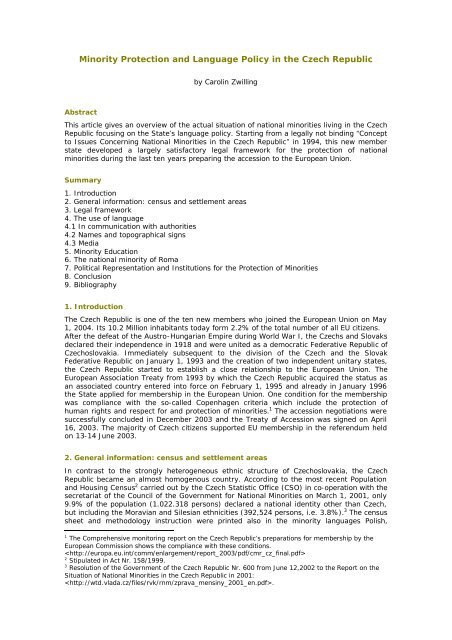
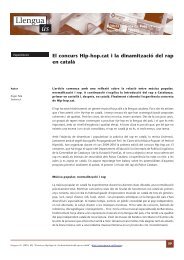

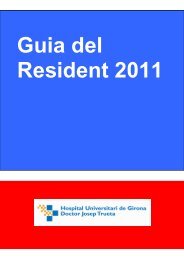

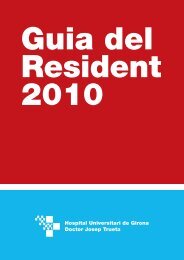
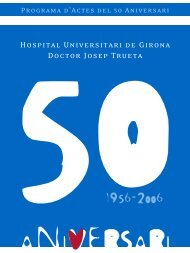
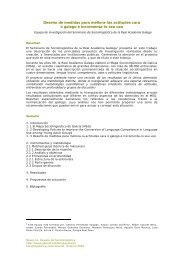
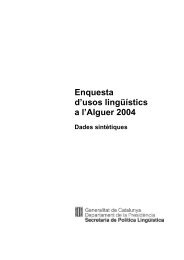
![Mestres, J.M. [et. al]. Manual d'estil: la redacció i l'edició de textos](https://img.yumpu.com/31252673/1/184x260/mestres-jm-et-al-manual-destil-la-redaccia-i-ledicia-de-textos.jpg?quality=85)
